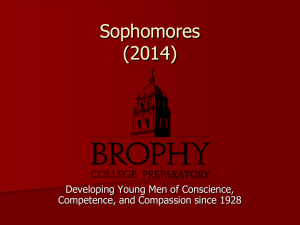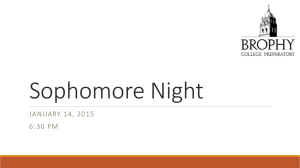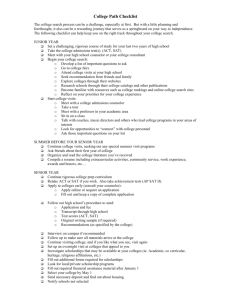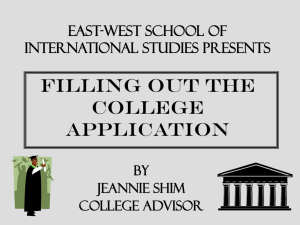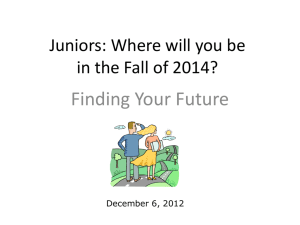sept.Vol.1_Iss.1
advertisement
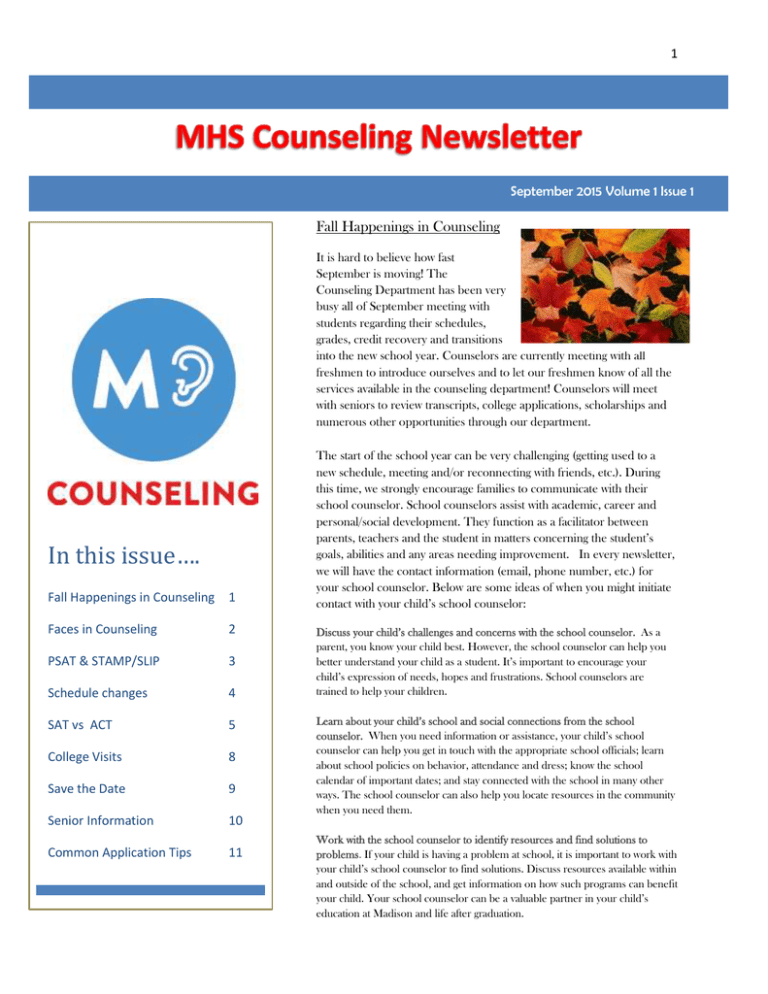
1 September 2015 Volume 1 Issue 1 Fall Happenings in Counseling It is hard to believe how fast September is moving! The Counseling Department has been very busy all of September meeting with students regarding their schedules, grades, credit recovery and transitions into the new school year. Counselors are currently meeting with all freshmen to introduce ourselves and to let our freshmen know of all the services available in the counseling department! Counselors will meet with seniors to review transcripts, college applications, scholarships and numerous other opportunities through our department. In this issue…. Fall Happenings in Counseling 1 Faces in Counseling 2 PSAT & STAMP/SLIP 3 Schedule changes 4 SAT vs ACT 5 College Visits 8 Save the Date 9 Senior Information 10 Common Application Tips 11 The start of the school year can be very challenging (getting used to a new schedule, meeting and/or reconnecting with friends, etc.). During this time, we strongly encourage families to communicate with their school counselor. School counselors assist with academic, career and personal/social development. They function as a facilitator between parents, teachers and the student in matters concerning the student’s goals, abilities and any areas needing improvement. In every newsletter, we will have the contact information (email, phone number, etc.) for your school counselor. Below are some ideas of when you might initiate contact with your child’s school counselor: Discuss your child’s challenges and concerns with the school counselor. As a parent, you know your child best. However, the school counselor can help you better understand your child as a student. It’s important to encourage your child’s expression of needs, hopes and frustrations. School counselors are trained to help your children. Learn about your child’s school and social connections from the school counselor. When you need information or assistance, your child’s school counselor can help you get in touch with the appropriate school officials; learn about school policies on behavior, attendance and dress; know the school calendar of important dates; and stay connected with the school in many other ways. The school counselor can also help you locate resources in the community when you need them. Work with the school counselor to identify resources and find solutions to problems. If your child is having a problem at school, it is important to work with your child’s school counselor to find solutions. Discuss resources available within and outside of the school, and get information on how such programs can benefit your child. Your school counselor can be a valuable partner in your child’s education at Madison and life after graduation. 2 Faces in the Counseling Center Malaina Guzman A-F Caseload mguzman1@pps.net The Madison Counseling department has expanded! Please help us welcome Jerardo Marquez! He may look familiar to some as he interned at Madison three years ago. Jerardo brings experience facilitating Equity student groups, technical knowledge, and a great sense of humor and comradery. Jerardo Marquez K-P Caseload jmarquez@pps.net Erin Hale of Jerardo, Madison With the addition G-J + AVID Caseload ehale@pps.net counseling is now organizedDavid by Salerno alphabet to Owens Counseling Intern better serve our community. Erin Hale G-J + AVID Caseload ehale@pps.net David Salerno Owens is joining the counseling staff as an Intern from Lewis & Clark College. He will be here twice a week all year long. David has experience mentoring and supporting students from his work with the GEAR UP program. Julie Hunt Counseling Secretary jhunt@pps.net David Salerno Owens Counseling Intern Kelly Shelton Q-Z Caseload kshelton@pps.net 3 PSAT Testing On Wednesday, October 14th, Madison will be administering the PSAT to all current sophomores and a few select Juniors. This exam is extremely important not only as a tool to be exposed to and predict how a student will do on the real SAT, but the scores are also sometimes a factor used for class placements, so try your best! The PSAT is a test that measures critical reading, math, and writing skills. This test is similar to the real SAT, which we don’t suggest taking until the Winter or Spring of Junior year. This test does not require students to recall specific facts from classes. As Juniors, high scores can result in scholarship opportunities, such as the National Merit Scholar Qualifying Test (NMSQT). Currents sophomores and pre-registered Juniors must report to school at the regular start time. More detailed information to come…stay tuned! STAMP/SLIP Tests STAMP/SLIP tests are internet-based tests that are an option for high school students to earn academic credits for language proficiency and may allow a student to fulfill the district’s two year world language requirement. The STAMP/SLIP tests are offered in many languages such as Arabic, Chinese Simplified, Chinese Traditional, French, German, Russian, Vietnamese and Spanish. There is a NO fee to register to take the test. Students can earn up to 4 credits. For more information and to register for the tests, please contact your school counselor. 4 Schedule Changes/Last Day to Add/Drop Classes By the time you receive this newsletter, your student has received their schedule and is in the full swing of school. We highly encourage you to review their classes to make sure they have all of their required courses (i.e. math, science, English, etc.). If you have any questions, please feel free to contact us …. just remember we receive a lot of calls/emails this time of year so it might take us a little while to get back to you. The last day to add/drop classes for first semester without penalty will be Thursday, September 17 , 2015. After this date, a dropped class will result in a Withdraw Fail as a final grade. We would like to avoid this at all costs, so please be in contact with your student’s teacher and counselor ASAP! th Mental Health Resources/School Based Health Clinic Madison High School has school-based mental health counselors available five days a week. This service is being offered through a partnership with Multnomah County. Therapists will see students by appointment. To be seen by a therapist, a referral needs to be initiated by your student’s school counselor. If you believe your student could benefit from mental health counseling, please contact your school counselor. 5 The SAT and ACT are standardized tests used widely in the college admissions process. The SAT assesses college readiness by testing critical reading, mathematical reasoning, and writing skills. The exam lasts three hours and 45 minutes (for actual testing time), and includes these three sections: • Critical Reading: tests a student’s vocabulary, understanding of sentence structure and organization, and ability to answer questions based on a reading passage. • Math (or quantitative): tests knowledge of geometry, functions, probability, algebra, statistics, and data analysis. Now allows usage of a graphing calculator. • Writing: includes multiple-choice questions and a short essay, where students respond to a given prompt. Each section is scored out of a possible 800, with a total possible score of 2400. The SAT Reasoning Test is offered by the College Board. On each test date, you can take either the SAT or up to three SAT Subject Tests. The ACT assesses college readiness by testing what a student already knows in English, Mathematics, Reading and Science. The exam lasts 2 hours and 55 minutes (for actual testing time), plus an additional 30 minutes if you are taking ACT plus Writing (optional). All the sections are multiple choice with the exception of the Writing Test. • The English section tests punctuation, grammar, sentence structure, and consists of five prose passages with accompanying questions. • The Math section tests various levels of algebra, geometry, and some trigonometry, and permits use of a calculator. • The Reading section tests reading comprehension. • The Science section covers background knowledge in biology, chemistry, physics and earth/space sciences. • The Writing test (only available with the ACT plus Writing test) consists of one writing prompt, where the student is asked to present a point of view on an issue. Each section is scored out of a possible 36; the score report also includes a composite score out of 36. The ACT is administered by The ACT. 6 Every college and university in the United States will accept either the SAT or ACT. So which should you take? Princeton Review states, “It’s all about the numbers. Some students end up scoring substantially higher on the SAT;’ others do better on the ACT. In lieu of a crystal ball, we created the Princeton Review Assessment (PRA) designed to help you determine which test is a better fit with your abilities.” 7. ACT questions tend to be more straightforward. ACT questions are often easier to understand on a first read. On the SAT, you may need to spend time figuring out what you’re being asked before you can start solving the problem. For example, here are sample questions from the SAT essay and the ACT writing test (their name for the essay): SAT: What is your view of the claim that something unsuccessful can still have some value? ACT: In your view, should high schools become more tolerant of cheating? 2. The SAT has a stronger emphasis on vocabulary. If you’re an ardent wordsmith, you’ll love the SAT. If words aren’t your thing, you may do better on the ACT. 3. The ACT has a Science section, while the SAT does not. You don’t need to know anything about amoebas or chemical reactions for the ACT Science section. It is meant to test your reading and reasoning skills based upon a given set of facts. But if you’re a true science-phobe, the SAT might be a better fit. 4. The ACT tests more advanced math concepts. In addition to basic arithmetic, algebra I and II, and geometry, the ACT tests your knowledge of trigonometry, too. That said, the ACT Math section is not necessarily harder, since many students find the questions to be more straightforward than those on the SAT. 5. The ACT Writing Test is optional on test day, but required by many schools. The 25-minutes SAT essay is required and is factored into your writing score. The 40-minutes ACT writing test is optional. If you choose to take it, it is not included in your composite score- schools will see it listed separately. Many colleges require the writing section of the ACT, so be sure to check with the schools where you are applying before opting out. 6. The SAT is broken up into more sections. On the ACT, you tackle each content area (English, Math, Reading and Science) in one big chunk, with the optional writing test at the end. On the SAT, the content areas (Critical Reading, Math and Writing) are broken up into 10 sections, with the required essay at the beginning. You do a little math, a little writing, a little critical reading, a little more math, etc. When choosing between the SAT and ACT, ask yourself if moving back and forth between content areas confuse you or keep you energized? 7. The ACT is more of a “big picture” exam. College admissions officers care about how you did on each section of the SAT. On the ACT, they’re most concerned with your composite score. So if you’re weak in one content area but strong in others, you could still end up with a very good ACT score and thus make a strong impression with the admissions committee. Source: Princeton Review 7 College Entrance Exam Registration Dates and Deadlines For a side by side comparison of the SAT and ACT go to Kaplan and for additional key differences, go to Study Tips. There are several resources in Multnomah County to help students prepare for the SAT or ACT. Check with For the 2015-2016 school year your counselor for a complete listing. SAT Test Date Registration Deadline Late Registration Deadline (extra fee applies) October 3, 2015 September 3, 2015 September 18, 2015 November 7, 2015 October 9, 2015 October 23, 2015 December 5, 2015 November 5, 2015 November 20, 2015 January 23, 2016 December 28, 2015 January 8, 2016 March 5, 2016 February 5, 2016 February 19, 2016 May 7, 2016 April 8, 2016 April 22, 2016 Jun 4, 2016 May 5, 2016 May 20, 2016 SAT Test Date Registration Deadline Late Registration Deadline (extra fee applies) September 12, 2015 August 7, 2015 August 8-21, 2015 October 24, 2015 September 18, 2015 Sept. 19-Oct 2, 2015 December 12, 2015 November 6, 2015 November 7-20, 2015 February 6, 2016 January 8 2016 January 9-15, 2016 April 9, 2016 March 4, 2016 Mary 5-18, 2016 June 11, 2016 May 6, 2016 May 7-20, 2016 To register, go to ACT Please see your counselor if you receive free or reduced lunch. To register, go to the College Board Please see your counselor if you receive free or reduced lunch. 8 UPCOMING COLLEGE VISITS In B2, College & Career Center All visits are posted in Naviance under ‘upcoming college visits.’ To attend an event, register in Naviance. See your counselor, counseling secretary, or Career Coordinator for login information. Date & Time College/Military Mon., Sept. 28 @ 10am Evergreen College Wed. Sept. 30 @ 1pm Hawai’I Pacific University Wed. Sept. 30 @ 1:30pm Pacific Lutheran University Tues. Oct. 6 @ 10am OregonTech Wed., Oct. 7 @ 10 am Willamette University Wed. Oct. 14 @ 10am George Fox University Friday, Oct. 23 @ 9am – 12pm National College Fair at the Oregon Convention Center Saturday, Oct. 24 @ 1pm – 5pm Register at: NACAC Student Registration Mon. Oct. 26 @ 10am Colorado College 9 Event Date Counselor Groups with Freshmen in CCE classes Week of Sept. 14 Late day to add/drop classes before WF Sept. 17 Activities Fair (main hallway) Week of Sept. 21 during FLEX time Counseling curriculum with seniors in Gov/Econ classes Week of Sept. 28 – Oct. 2 SUN School Tutoring Begins (Library) Week of Sept. 28 Counselor groups with Freshmen in CCE classes Week of Oct. 12 PSAT (Sophomores + some Juniors) Oct. 14 (during school) Parent/Teacher Conferences (Cafeteria) Oct. 20-22 College Application Week in the College & Career Center(CCC) Nov. 2-6 ECMC College Nightthe MHS Auditorium Nov. 5 (ALL grades are welcome!) Counseling curriculum with juniors in English Week of Nov. 9 Counseling curriculum with sophomores in US History Week of Nov. 23 FAFSA & Scholarship Fair Dec. 1 (seniors & parents/guardians only) 10 SOME HELPFUL INFORMATION FOR SENIORS AND THEIR PARENTS Be sure to check Naviance on a regular basis. We are constantly updating it with current events, workshops, college information, SAT/ACT information and everything you need to know about College Planning. If you haven’t already done so, you need to fill out a resume/Activity Chart, Student Information Sheet, and encourage your parents to fill out the Parent Brag Sheet on Naviance. Click on “document library” on the welcome page of Naviance to find the links for students and parents. Your counselor needs this information to write your letter of recommendation. Give your counselor and teachers at least two weeks before your application due date. Carefully review your transcript. Notify your counselor immediately if you think there might be an error. Update your “Colleges I’m Thinking About” in Naviance. As you apply to the college, move the college over to “Colleges I’m Applying To.” Please be sure to request transcripts from Naviance in order for your request to process smoothly. Register for the SAT’s and/or ACT’s. If you have a December deadline, November is the last time to take the SAT/ACT (and that’s pushing it!). You are responsible for keeping track of your deadlines. Be sure to send your ACT/SAT scores to your colleges directly from ACT/Collegeboard’s website. 11 The Common Application is used by most private schools to apply to college. It allows students to complete one application with their personal information, involvement in activities and community service and several essays that get sent to all the schools that request it so that students don’t waste time applying separately. If there are fees that colleges will charge to apply, the student pays them through the Common Application when he/she submits before the deadline. The website for the Common Application is: https://www.commonapp.org. We invite all grade level of our students to look at the types of questions that are included so they can get explore and become involved in activities early in high school. Always remember that counselors can access waivers for college fees for any student who is on free/reduced lunch. State schools (University of Oregon, OSU, PSU, UC Berkeley, U of Washington, and University of Montana) do NOT use the Common Application. You find their applications on their websites. 4 Things Students Should Know about the Common App Click Here 3 Things Parents Should Know about the Common App Click Here 2015-2016 Essay Prompts Click Here How to link your MHS Naviance account with your Common App coming soon! Common App Requirements Grid Click Here 12 FIND THEM IN NAVIANCE: Login to Naviance Go to the Colleges Tab Scroll down to Scholarship List Search for scholarships!
